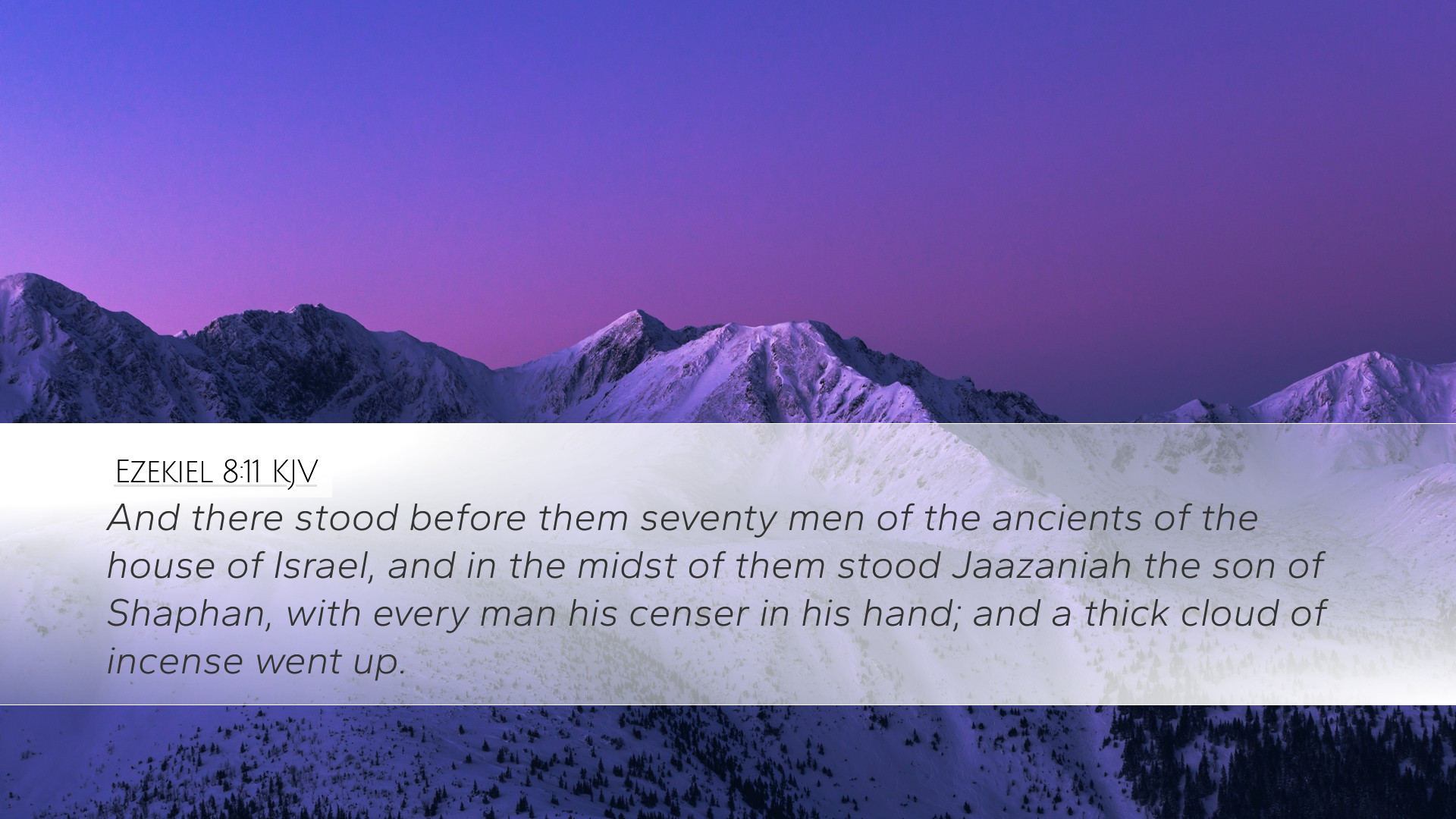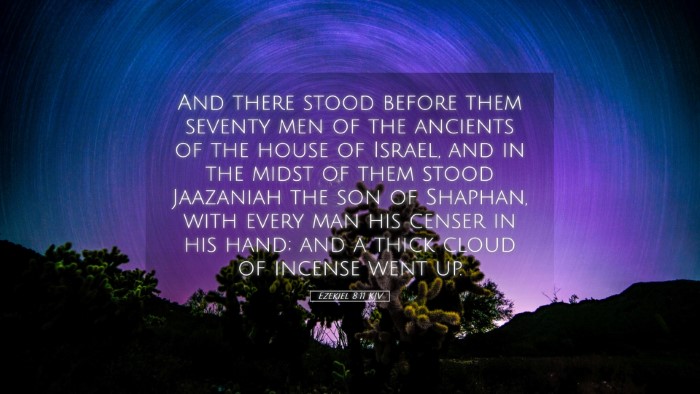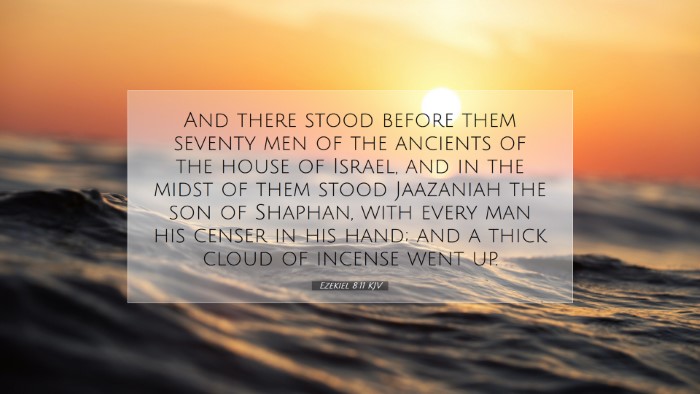Bible Commentary on Ezekiel 8:11
Ezekiel 8:11: "And there stood before them seventy men of the ancients of the house of Israel, and in the midst of them stood Jaazaniah the son of Shaphan, with every man his censer in his hand; and a thick cloud of incense went up."
Contextual Overview
The Book of Ezekiel is a prophetic text that encompasses both visions and parables delivered by Ezekiel during the Babylonian exile. In this particular chapter, Ezekiel is transported in spirit to Jerusalem, where he witnesses various abominations taking place within the temple. This verse highlights the leadership of Israel—seventy elders—practicing idolatry, which is pivotal to understanding the spiritual state of the nation.
Insights from Matthew Henry
According to Matthew Henry, the elders represent a significant portion of the leadership in Israel, and their involvement in idolatrous behavior is alarming. He notes that these men, "the ancients of the house of Israel," should have been the spiritual guides of the nation, yet they have turned to sin instead. Henry emphasizes the gravity of this transgression, describing how their actions lead to a thick cloud of incense—a symbol associated with worship that is perverted for idolatrous ends.
Henry further discusses Jaazaniah, the son of Shaphan, suggesting that his name implies "Yahweh has heard." This is deeply ironic as those who are supposed to embody Yahweh’s presence are instead engaging in practices that provoke His anger. The use of censers indicates that they are not only aware of their worship but have the audacity to perform it in a manner that directly contravenes God’s laws.
Insights from Albert Barnes
Albert Barnes provides detailed exegesis on this passage, focusing on the symbolism of incense and the significance of the number seventy. He refers to the seventy elders as a representation of Israel's spiritual and governmental authority and warns that their actions jeopardize the entire nation. Barnes notes that the incense, typically a pleasing aroma to God when offered correctly, is now associated with idolatrous practices and thus becomes a stench in the nostrils of the Almighty.
Barnes also remarks on the descriptive language used in the text. The "thick cloud of incense" serves as a potent image of the religious corruption taking place, and it emphasizes the contrast between true worship and falsehood. He asserts that such a visible display of idolatry reveals the depths of corruption among those who should have known better, serving as a warning to contemporary leaders not to compromise their spiritual integrity.
Insights from Adam Clarke
Adam Clarke offers a thorough investigation into the implications of the actions of these elders. He observes that the censer, while a legitimate instrument in proper worship, has now become a tool for false worship. Clarke surmises that the presence of Jaazaniah signifies a leadership that has lost its way—instead of guiding the people back to righteousness, they lead them astray.
Clarke also discusses the significance of "seventy" as a number representing fullness or completion in biblical numerology. This structure suggests that even the leaders, who should have the spiritual maturity to discern right from wrong, completely failed in their duties. The passage stands as a stark reminder of the consequences of spiritual blindness among God’s people.
Theological Implications
This verse has profound implications for theology and ecclesiology. It raises critical questions about leadership in spiritual contexts. Those in authority are called to uphold and teach God's truth, but when they abandon their duties, the community suffers. The failure of the elders in Ezekiel’s vision serves as a reminder to modern-day leaders about the importance of spiritual fidelity and accountability.
Moreover, the incident emphasizes God's holiness and intolerance for idolatry. Incense, representing prayer and intercession in its purest form, is corrupted when offered to false gods. This reaffirms the call for the Church today to present itself as a living sacrifice, holy and acceptable to God (Romans 12:1), ensuring that worship remains untainted by sin.
Application for Pastors and Theologians
- Leadership Accountability: Pastors and church leaders must be vigilant regarding their spiritual health and practices. The example of the elders serves as a severe warning against complacency and the allure of worldly practices.
- Integrity in Worship: All forms of worship must align with Scripture. This commentary urges leaders to ensure their congregations engage in worship that is pure and acceptable before God.
- Awareness of Spiritual Blindness: It's essential to remain humble and aware of the potential for spiritual blindness in leadership roles. Regular self-examination and accountability should be part of a leader's ministry.
- Teaching the Sanctity of Worship: Biblical literacy among congregations should be a priority, guiding them in understanding the importance of worshiping God in a way that honors His holiness.
Conclusion
Ezekiel 8:11 paints a harrowing picture of spiritual decay within the leadership of Israel. By combining insights from Matthew Henry, Albert Barnes, and Adam Clarke, we discern the weight of communal responsibility in spiritual matters. It is vital for contemporary church leaders to reflect on these insights, ensuring that they guide their congregations with integrity and devotion to God’s glory.


